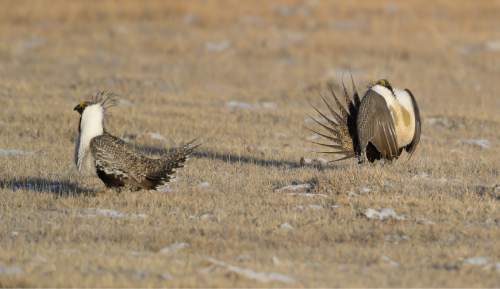This is an archived article that was published on sltrib.com in 2015, and information in the article may be outdated. It is provided only for personal research purposes and may not be reprinted.
Washington • A House committee has advanced a defense bill that includes language by Rep. Rob Bishop to prohibit the listing of the sage grouse as an endangered species for 10 years.
Bishop, R-Utah, says the amendment is aimed at saving the Defense Department millions of dollars and to curtail activities on domestic military facilities, like Utah's Test and Training Range, some of which includes the animal's habitat. The Fish and Wildlife Service could designate the Greater sage grouse — in decline in its range in 10 Western states — as endangered or threatened later this year.
The House Armed Services Committee struck down an effort that would have killed Bishop's language on a party-line vote and approved the overall measure early Thursday.
"This amendment, which balances conservation with national security, is basically about two things — military readiness and empowering the states," Bishop said in a statement. "There is ample evidence that federal management of sage grouse populations is already hurting our military's ability to adequately train on and use critical areas in the West. This would only get worse with a federal endangered species designation and it would hamper the way our fighting men and women prepare to defend our country."
While Republicans argued that Bishop's language was germane to the defense bill, Democrats and environmental groups countered that it was a ruse to use the military readiness argument to achieve what GOP lawmakers have been trying to do all along.
Rep. Niki Tsongas, D-Mass., said Bishop's amendment would "set an unacceptable precedent" and weaken the Endangered Species Act and the collaborative efforts by the federal land-management agencies, states, sportsmen, ranchers and conservationists to rebuild sage-grouse habitat. Tsongas had led the unsuccessful effort to kill Bishop's rider.
The group Backcountry Hunters & Anglers condemned Bishop's language in the defense bill, saying it would unravel years of efforts to sustain the grouse and its habitat.
"For the congressman to label this consensus-based approach as representing an extreme environmentalist agenda is ludicrous," said Land Tawney, executive director of the group. "Time and time again, Americans have gone on record in support of our public lands, wildlife and outdoors way of life. These values are central not only to our economic security but also our national identity."
Bishop said states are best equipped to manage the sage-grouse populations and have done so effectively without the federal government's intrusion.
"We need to give time for these state plans, orchestrated by folks closest to the land and to the issue at hand, to be fully implemented and to accomplish their goal of protecting this bird," Bishop said.
A Defense Department spokesman told Energy and Environment Publishing that the military has coordinated with the Fish and Wildlife Service and states to protect the sage grouse and it hasn't hurt their operations.
"While some of the management actions we have instituted have necessitated changes in when and how we use certain areas of our installations — especially during breeding season — none have resulted in unacceptable limits on our military readiness activities," Mark Wright told the news outlet. "Because we have already undertaken these actions voluntarily, and expect to need to manage for the sage-grouse indefinitely, we do not believe the listing decision — regardless of the outcome — will affect our mission activities to any great degree."
The bill now moves to the House floor.



